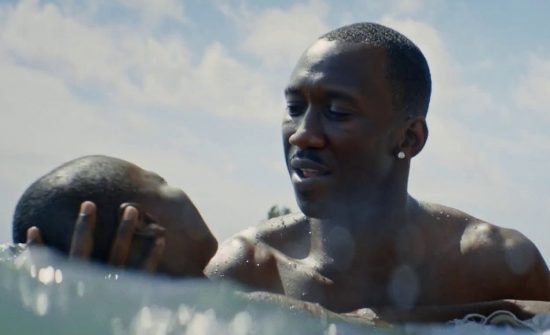Late To The Party: Moonlight – “Arresting, haunting, and deeply romantic”
Late To The Party is a series of reviews ranging from classical masterpieces to modern-day blockbusters where I look to make my confession for the sin of not having seen them before. I seek absolution from the film universe and hope to never again suffer your disdain for my film faux pas. I am Fredo, in the boat. Hail Mary, full of grace.
This week’s film is Barry Jenkins’s 2016 eventual Oscar winning drama, Moonlight. Based upon Tarell Alvin McCraney’s play, ‘In Moonlight Black Boys Look Blue’, it stars Alex R. Hibbert, Ashton Sanders and Travante Rhodes respectively in the central role of Little, Chiron and Black as he is referred to during three different stages of his life. The supporting cast includes Mahershala Ali, Naomie Harris and Janelle Monáe.
The film follows the story of Chiron through three pivotal points in his life, pre-teen (Little), 16 years old (Chiron), and approximately 10 years later (Black). Set in a harsh and impoverished Miami neighbourhood, a boy discovers and comes to terms with his own identity and sexuality, while trying to live with his crack-addicted mother and being picked upon by kids in his neighbourhood where being different is a sign of weakness and is punished.
The film opens with Little fleeing a group of bullies into a derelict house where he is found by local drug dealer Juan, played in an Oscar-winning turn by Ali. Juan and his girlfriend, Teresa (Monáe) befriend Little. They quickly become the only positive adult role models in the boy’s life. A situation complicated by Little discovering Juan is the dealer that sells crack to his mother Paula, played with heartbreaking desperation by Naomie Harris. Little is picked on by the other boys, all except for his one friend, Kevin who is the opposite of Little; confident, brash, and comfortable with physically imposing himself. Little is quiet, almost silent, unsure, and alienated from an unforgiving world that demands men to be harsh and uncaring.
Moonlight is a hypnotic, dream-like film that is many things at once. It is a coming of age film, a tender love story, a film about sexuality, identity and the myth of masculinity.
Filmed exquisitely by James Laxton, the camera’s slow, gliding movements heightens the sense of alienation felt by our central character. Tight, handheld close-ups force us to feel Little’s desperation during an early scene where the two friends wrestle in the middle of a field. The camera circles a bully in a kinetic schoolyard sequence the leaves the heart-pounding and mindful of when inevitable fears have to be faced, regardless of the outcome.
The music is wonderfully diverse and perfect in both setting moments and carrying them throughout, from Boris Gardner to Mozart and from Caetano Veloso to Barbara Lewis. The soundtrack is abrasive when required, but also romantic and ethereal in equal measure.
Water is a constant metaphor throughout the film, from Little’s intoxicating release of learning to swim in the moonlit ocean as a young boy to the painful affirmation of suffering with Chiron’s beaten and bloody face submerged in a sink filled with ice-cold water. The moment when Chiron, sat on the beach, listening to the ocean confesses that he feels like crying so much, he could just turn into teardrops is utterly devastating.
The performances from the whole cast are faultless. Janelle Monáe is endearing as the ever nurturing Teresa. Mahershala Ali deservedly won the Best Supporting Actor Oscar as Juan the drug dealer who reaches out to and cares for Little. Naomie Harris’s portrayal of Little’s crack-addicted mother, Paula reminds us yet again she an actress with a dizzying range and great depth. Trevante Rhodes and Andre Holland are outstanding as the adult incarnations of Black and Kevin respectively. Their scene in the diner towards the end of the film is both tender and full of suspense, where all is revealed in the silences between the words and the painful glances that hint at deeply buried feelings.
The real standout performances are from the two young actors who play Little and Chiron during his formative years. Ashton Sanders plays sixteen-year-old Chiron in the second section of the film brilliantly. He expertly expresses not only the ‘sturm und strang’ of teenage angst and fear of feeling different but also a tenderness that could ignite into a rage like a touch paper at any point. Alex R. Hibbert is mesmerising and haunting as the alienated Little. A performance of such intensity, maturity, and restraint from someone so young, is something quite rare. The two performances are even more remarkable considering they never met or saw each other’s work during the whole shoot.
The pacing of the film ebbs and flows, allowing characters to breathe and the story to evolve naturally. Nothing ever feels forced and the film’s unforgiving world is realised perfectly. A world where real emotions are buried deep down and the self’s true nature is disguised out of fear of being exposed and destroyed. The film makes brave choices and brilliantly challenges what it means to be a young man in urban America. It is arresting, haunting, and deeply romantic. It is a film that will stay with me for a long time and will most certainly bear repeated viewings.











